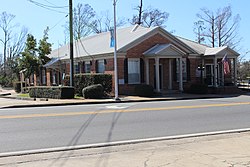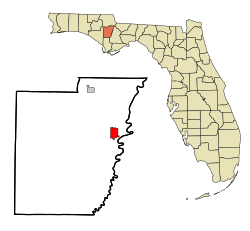2010 and 2020 census
As of the 2020 United States census, there were 2,266 people, 1,149 households, and 647 families residing in the city. [16]
In 2020, there was a 47.0% employment rate and a median household income of $37,083. 28.6% of the population lived below the poverty threshold. The median age in the city was 38.0 years old. [17]
As of the 2010 United States census, there were 2,514 people, 968 households, and 610 families residing in the city. [18]
2000 census
As of the census [5] of 2000, there were 2,444 people, 913 households, and 595 families residing in the city. The population density was 767.2 inhabitants per square mile (296.2/km2). There were 1,046 housing units at an average density of 328.4 units per square mile (126.8 units/km2). The racial makeup of the city was 65.18% White, 31.79% African American, 1.27% Native American, 0.33% Asian, 0.08% Pacific Islander, 0.29% from other races, and 1.06% from two or more races. Hispanic or Latino of any race were 0.70% of the population.
In 2000, there were 913 households, out of which 27.4% had children under the age of 18 living with them, 40.6% were married couples living together, 21.6% had a female householder with no husband present, and 34.8% were non-families. 31.8% of all households were made up of individuals, and 17.9% had someone living alone who was 65 years of age or older. The average household size was 2.39 and the average family size was 2.99.
In 2000, in the city, the population was spread out, with 23.2% under the age of 18, 8.1% from 18 to 24, 22.1% from 25 to 44, 21.3% from 45 to 64, and 25.3% who were 65 years of age or older. The median age was 42 years. For every 100 females, there were 75.7 males. For every 100 females age 18 and over, there were 71.8 males.
In 2000, the median income for a household in the city was $23,271, and the median income for a family was $30,880. Males had a median income of $23,313 versus $20,000 for females. The per capita income for the city was $11,498. About 18.5% of families and 24.3% of the population were below the poverty line, including 33.6% of those under age 18 and 17.7% of those age 65 or over.







